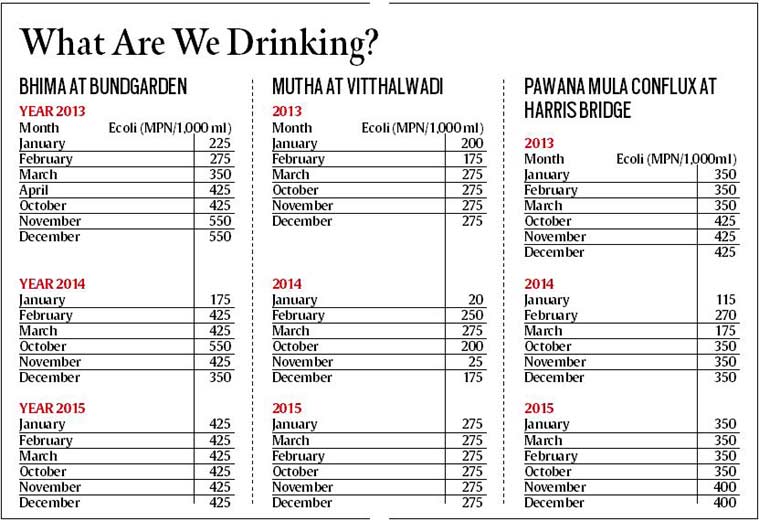Puneites in deep water: Alarming rise in fecal coliform in city rivers worrisome
While the Centre’s ambitious plan to clean up the river bodies remain in a state of limbo, residents, living downstream, are adversely affected by the high levels of pollutants in the water.
 Environmentalists say it is a clear indication of the failure of the sewage treatment mechanism in the city. Express
Environmentalists say it is a clear indication of the failure of the sewage treatment mechanism in the city. Express
OVER THE last three years, monthly reports generated by the Maharashtra Pollution Control Board (MPCB) about the rivers in Pune have show an alarming rise in the concentration of fecal coliform — anaerobic, rod-shaped, gram-negative bacterium — in the river water. This, experts say, is a clear indication of increased mixing of untreated sewage into the river water. While the Centre’s ambitious plan to clean up the river bodies remain in a state of limbo, residents, living downstream, are adversely affected by the high levels of pollutants in the water.
As per its mandate, the MPCB conducts monthly water quality tests at multiple locations on various river bodies of the city. Other than measuring the dissolved oxygen level, biological oxygen demand, chemical oxygen demand the fecal coliform levels are also measured. Fecal coliform is a bacteria which comes into freshwater in case of sewage water contamination.
Water samples are collected from the Mutha at Vitthalwadi, at Bundgarden and Shivajinagar. Similarly, samples are collected by the MPCB at Harris Bridge, Audhgaon for the Mula. Samples from Pawana and Indrayani are also collected on a monthly basis for testing. Needless to say, at all the points, the presence of fecal coliform has been on a rise.

Samples collected from the Mutha at Vitthalwadi shows, on an average, the ecoli count over the last three years (January 2013- December 2015) has been more than 250 (MPN/1,000ml). The count on December 2013 was 250 MPN/1,000ml, which jumped to 350 MPN/1,000ml during April 2014 and on March 2015, the recorded value was 275 MPN/1,000ml. The count had remained within that range during the above time period. It might be pointed out that this is the measuring station just before the river enters the city.
By far, the rise has been maximum at the measuring station at Bundgarden where the average count has been over 450 MPN/1,000ml for the last three years. On July 2013, the recorded count was 900 MPN/1,000ml the highest in the last three years. The count on December 2013 was 550 MPN/1,000ml, while on April 2014, the count was 275 MPN/1,000 ml and on December 2014 it was 350 MPN/1,000ml.
Through out last year, the count has been more than 400 MPN/1,000ml. In fact, the dissolved oxygen level at this point has been zero, indicating complete lack of aquatic life in the river.
The measuring station at Harris Bridge is at the conflux of Mula and Pawana. Over the last three years, the average ecoli count at this point has been over 300. Starting with a count of 350 MPN/1,000ml on December 2013, the count had bettered at the station to 275 MPN/1000ml during April 2014 but had again deteriorated to 350 MPN/1,000 ml on December 2014 and the whole of last year in the range of 350-400 MPN/1,000ml. At this measuring station, dissolved oxygen level has gone zero more than once indicating complete absence of aquatic life.
The trend, according to environmentalist Parineeta Dandekar is a clear indication of the failure of the sewage treatment mechanism in the city. “Pune’s Sewage Treatment Plants (STP) are poorly managed and only 40 per cent of generated sewage is treated. The present solution of constructing costly STPs at places to treat sewage is clearly not working,” she said.
Dandekar said that a proper audit of the sewage generation and treatment has to be undertaken in the city. “There are many housing societies in the newly-developed areas which are not connected to the main sewage lines. As per the PMC figures, around 40 per cent of the city’s population lives in slums with no access to a proper sewage system,” she said.
In the year 2010, the state government had prepared a detailed project report on steps to be taken to tackle the problem. The plan had talked of construction of multiple STPs and other measures which to date, have failed to materialise. City MP Anil Shirole said, the city awaits funds under the Central government’s plan to clean the rivers. “The work has started and it will be executed soon,” he said.







